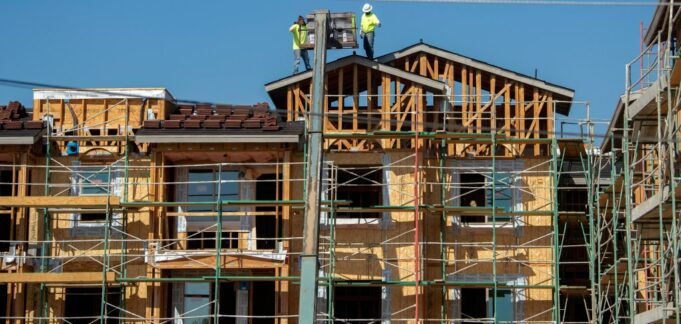California needs to build 2.5 million homes by the end of the decade to address the state’s current housing shortgage, more than double the goal from the last planning period, state housing officials announced Wednesday, March 2. Of those, at least 1 million must be affordable to low-income households.
The new goal is part of a once-every-four-years housing plan unveiled Wednesday. “California’s housing crisis is half a century in the making. And after decades under-production, supply is far behind need, and housing and rental costs are soaring,” said Megan Kirkeby, deputy director for housing policy at the state Department of Housing and Community Development. Cost-burdened renters and homeowners are “making hard decisions about childcare, transportation, food (and) healthcare” since so much of their income is going for housing, Kirkeby said. “The statewide housing plan helps visualize this need,” she said.
“We need new construction of all (housing) types. We lag behind where we need to be.” The new plan is based on the state’s Regional Housing Needs Assessment, or RHNA (pronounced Reena), which requires each city and county in the state to plan for needed housing for low-, moderate- and upper-income households based on such factors as population growth and overcrowding. Six Southern California counties account for just over half of the statewide housing goal. The state determined in 2019 that Southern California’s 191 cities must plan for construction of 1.34 million new homes by 2030.
Just 588,344 new homes were built statewide during the past eight-year planning period, or less than half the 1.2 million-home goal. Past efforts to meet housing goals under the state’s half-century-old RHNA law also fell well below target. This time around, Kirkeby said, there are new tools to help cities meet their goals and stiff consequences for those that fail to adequately plan for future homebuilding. The first consequence is less time to rezone land needed for future housing. Southern California cities needed to have their housing plans (or “housing elements”) approved by Feb. 12. Just eight cities in the region met that goal, Kirkeby said this week. Those that met the Feb. 12 goal have three years to rezone land to accommodate future homebuilding. The rest must complete all their rezoning by next Oct. 15 to be in compliance.
Cities that fall out of compliance face the possibility of getting sued by the state (as happened to Huntington Beach in 2019) and face fines starting at $10,000 per month. They also face the possible cutoff of state grants for programs like parks, the loss of their ability to issue building permits and the automatic approval of building projects that include affordable housing. “Those are tools we have to encourage folks to do the work to come into compliance,” Kirkeby said. “And then there’s broad discretion to impose other remedies, including appointing an agent to complete your housing planning on the jurisdiction’s behalf.”
This year’s 2.5 million-home goal by 2030 is a far cry from Gov. Gavin Newsom’s 2018 campaign pledge to build 3.5 million homes by 2025. However, Newsom backed off that number early in his term as governor, calling it “aspirational.” Nonetheless, state housing Director Gustavo Velasquez said in a statement, housing reforms passed in recent years are designed to make sure housing not only gets planned for, but actually built.
“It is imperative that we utilize every resource to get the housing we need for our state’s residents,” Velasquez said. Related Articles Californians going back to the office soon? Investors don’t think so How to safely tap home equity in a financial emergency Need to expand? Finding additional warehouse space is ‘easy’ Real estate news: 8 Los Alamitos apartments sell for $3.9 million, or $489,375 each.
Written By Jeff Collins for The OC Register











